- Home
- Elizabeth George
What Came Before He Shot Her Page 15
What Came Before He Shot Her Read online
Page 15
Ness looked away from her. She dug her cigarettes—which were Kendra’s pinched Benson & Hedges—from her shoulder bag and lit one. She and her aunt were sitting on stools at a counter that ran along the front window of the café, and a group of boys were passing. Their steps slowed when they saw Ness in the window and they spoke among themselves. Ness nodded at them. It was a movement that seemed almost regal. In reply, they gave head jerks that appeared oddly respectful and kept moving.
Kendra noted this. The brief contact between Ness and the boys, even though it was only visual, sent a chill of intuition down Kendra’s spine. She couldn’t say what it all meant—the nod, the boys, the chill she felt—except that it didn’t seem good.
She said, “Toby and Joel, Ness. They want you home as well. Toby’s birthday’s coming. With all the changes been happening in your lives over these months, if you were there—”
“You wantin me to mind dem, innit,” was Ness’s conclusion. “Dat’s why you here. Toby ’n’ Joel finally getting in your way. Wha’ else you want, den?”
“I’m here because I did wrong to you and I want you to know that I know I did wrong. I want to say sorry. I want us to be family to each other.”
“I ain’t got fam’ly.”
“That isn’t true. You have Toby and Joel. You have me. You have your mum.”
Ness sputtered a laugh. She said, “Yeah. My mum,” and drew in deeply on her cigarette. She hadn’t touched her coffee. Kendra hadn’t touched her own.
“Things don’t have to be this way,” she told Ness. “Things can change. You and I can start over.”
“T’ings end up way dey end up,” Ness said. “Ever’body want somet’ing. You no different.” She gathered up her belongings.
Kendra saw that she intended to leave. She played her wild card. “Social Services phoned,” she said. “Woman called Fabia Bender wants to meet with you. With me ’s well. We have to see her, Ness, because if we don’t—”
“Wha’? Like she goin to send me somewheres? Like I even care?” Ness adjusted her shoulder bag and tweaked the scarf in her hair. “I got people watchin out f’r me now. I got no worries ’bout Social Services, ’bout you, ’bout anyt’ing. An’ dat’s how it is.”
That said, she was gone, out of the café and heading back in the direction of Whiteley’s. In the sunlight of late spring, she teetered along the pavement on her high heels, leaving her aunt to wonder how much worse things could get between them.
WHEN THE DAY came for Joel to make his purchase of the lava lamp for Toby’s birthday, the first thing he had to sort out was what to do with his little brother while he made that purchase since Kendra was at work in the charity shop, and there was consequently no help from that quarter. Had Ness been at home, he would have asked her to look after him. It wasn’t an errand that would take terribly long since it comprised a jaunt to Portobello Road, a quick exchange of money in the shop, and then another jaunt back to Edenham Way. Even Ness in her present state might have been prevailed upon to remain with Toby, making sure he didn’t answer the door should a stranger knock upon it. But since she wasn’t there, Joel faced several choices. He could take Toby with him and spoil the birthday surprise; he could leave him at home and hope for the best; he could stow him in a spot where something in the place might possess an inherent interest designed to keep him occupied.
He thought of the duck pond in Meanwhile Gardens and the toast left over from breakfast. He decided that if he made a hiding place among the reeds—something akin to the fort Toby had spoken about fashioning there months ago—and he armed his brother with the toast for duck food, he could keep him safe and occupied long enough to buy the lava lamp and return.
So he gathered up the toast, added to it some extra bread just in case his errand took longer than he expected, and waited for his brother to blow up his life ring. That done, he made sure Toby wore a windbreaker against a potentially cool day, and they set off around the side of the houses to join the path that led along their back gardens. The sun was out, and the sun brought with it people wanting to enjoy the fair weather. Joel could hear them just beyond the child drop-in centre in the form of the whoosh of skateboard action in the skate bowl and children’s babble in the playing area of the drop-in centre itself. He worried at first that the pleasant weather might also mean people at the duck pond, but when he and Toby worked their way through the shrubbery and hopped on the secondary path that curved down to the water, he was relieved to see that no one was on the little dock. There were ducks aplenty, however. They paddled sublimely, occasionally bottom upping themselves as they searched beneath them for something to eat.
Along the edges of the pond, the reeds grew thickly. Although Toby complained that he wanted to be on the dock above the birds, Joel explained to him the benefits of secreting himself among the reeds instead. These were the duck houses, he told him. If he remained quiet and still in the reeds, there was a very good chance that the ducks would come to him and eat the bread right from his hand. Wouldn’t that be better than throwing it at them from the dock and hoping they’d notice?
Toby had little experience of ducks and consequently didn’t know that bread tossed into the water would attract any duck worth his feathers within a good fifty yards. The plan, as Joel explained it, sounded reasonable to him, so he was happy enough to be ensconced in a roughly fashioned duck blind in the reeds, from which he could watch the birds and patiently wait for them to discover him.
“You got to stay here,” Joel told him when he had Toby in place. “You got dat, innit? I’ll be back direc’ly I get somet’ing over Portobello Road. You wait right here. You do dat for me, Tobe?”
Toby had positioned himself on his stomach with his chin on the life ring that he’d wriggled higher on his body. He nodded and fastened his eyes on the water, just through the reeds. “Gimme the toast, den,” he said. “I bet dem ducks’s hungry.”
Joel made sure the toast and the bread were within reach. He backed out of the blind and climbed to the path. He was relieved to see that from above the pond, Toby was out of sight. He only hoped his brother would remain there, hidden. He didn’t intend to be gone for more than twenty minutes.
Heading for the shop in which Toby had shown him the lava lamp required him to make for Portobello Bridge, the viaduct that would take him over the railway tracks and into what remained of the open-air market of Golborne Road. He made the first part of the journey at a trot and, as he went, he wondered how much his little brother remembered about how their birthdays had once been celebrated. If it had been a good spell for their mother, there would have been five of them cramped around the little kitchen table. If it had been one of their mother’s bad times, there would have been only four, but their father would have made up for the absence of their mother by singing the special birthday song deliberately loud and deliberately out of tune, after which he would hand over a birthday present, like a pocketknife or a cosmetics bag, like in-line skates that were secondhand but cleaned up nicely or a special pair of trainers that a child longed for but never mentioned.
But all that had been before the Campbell children had been relocated to Henchman Street, where Glory did her best to create a celebration—as long as one of them reminded her that a birthday was coming up—but where George Gilbert usually threw a spanner in the works by coming home drunk, or using the birthday as an excuse to become drunk, or otherwise insinuating himself into the centre of what went for the festivities. Joel didn’t know what a birthday would be like at Kendra Osborne’s house, but he intended to make it as special as he could.
The massive estate of Wornington Green marked one of the turns Joel needed to make, but just along Wornington Road a sunken tarmac football pitch caught his attention. This pitch was lined in brick and fenced in on all four sides with chain link, and an angled top to this boundary was supposed to discourage anyone from using the area when it was not intended to be used. But a set of steps on the west side of the pitch allowed acce
ss to it since the gate at the top had long ago been destroyed, and the purpose of the pitch itself—offering a playing area for the children of Wornington Green—had been altered shortly afterwards: Below him, Joel could see one of the neighbourhood’s many graffiti artists in the midst of a project, applying his craft to the filthy brick walls in a rainbow of colours.
He was a Rasta, although his dreadlocks were secured beneath a large knitted cap that drooped with the weight of the hair inside it. The scent of weed drifted upward from him, and Joel could see that a spliff dangled between his lips. He appeared to be putting the finishing touches on a masterwork consisting of words and a cartoonlike figure. The words were red, highlighted with white and orange. They said “Question Not” and they served as the base of the figure who rose out of them like a phoenix from the ashes: a black man wielding knives in each hand, offering a suitably fierce snarl from a tattooed face. This finished piece was one of many already decorating the pitch: buxom cartoon women, cigarette or dope-smoking men in various poses, menacing cops with pistols drawn, guitarists bent backwards as they sent their music heavenward. Where there weren’t graffiti of this nature, there was tagging. Initials, names, sobriquets of the streets…It was difficult to imagine any child able to play football on the pitch with so many distractions.
“So wha’ you gawpin at, mon? You never seen artis’ at work?”
The question came from the Rasta, who’d taken note of Joel peering down through the chain-link fence. Joel took it at face value and not as the challenge it might have been, coming from another sort of man. This bloke looked harmless, a conclusion Joel reached based upon the somnolent expression on his face, as if he were being escorted to dreamland by the weed he was smoking.
“Dis ain’t art,” Joel said. “Art’s in museums.”
“Yeah? T’ink you could do dis, den? I hand over paint and you make something nice ’s dis?” He gestured with the spliff, pointing out his nearly finished piece.
“Who is it anyway?” Joel asked the Rasta. “Wha’s it mean ‘Question Not’?”
The Rasta approached him, leaving his spray paint behind. He came to the side of the pitch, his head cocked. He said, “You jokin, innit? You playin Cal Hancock for a fool.”
Joel frowned. “Wha’ you mean?”
“Askin’ who dis is? Mean to tell me, you don’ know? How long you been round here, mon?”
“January.”
“An’ you don’ know?” Cal shook his head in wonder. He took the spliff from his mouth and generously handed it up to Joel for a toke. Joel put his hands behind his back, the universal sign of refusal.
“You clean, den?” Cal Hancock asked him. “Dat’s good, mon. Give yourself a future. You got a name?”
Joel told him.
Cal said, “Campbell? Got a sister?”
“Ness, yeah.”
Cal whistled and took a deep drag on the spliff. “See,” he said. His nod was thoughtful.
“You know her or summick?”
“Me, mon? No. I don’ mess with women got mental shit goin on, y’unnerstan.”
“My sister ain’t…” What “mental” implied, the inescapable connection it offered to Carole Campbell, the future it promised: These were topics Joel dared not veer towards, not even to deny them. He kicked his trainer-shod toe against the low brick wall of the pitch.
“Maybe she ain’t, bred,” Cal said affably. “But she a bad piece of action have a man ragin long before she rage, lemme tell you dat. She shell-shock a bred, she want to, y’unnerstan? She leave him to wonder what hit him and how in hell he goin to manage gettin hit again.”
“You sure you ain’t her man?” Joel asked.
Cal chuckled. “Oh las’ time I checked, my bollocks in place, so I pretty sure, blood.” He gave a wink and sauntered back to his artwork.
“So who is it anyways?” Joel called after him, gesturing to the figure he was working on.
Cal waved lazily in reply. “You know when it’s time,” he told him.
Joel watched him for a moment, saw how he expertly laid on a curve of shading to the Q in Question. Then he moved off.
Some considerable time had passed since Toby had shown Joel the lava lamp he wanted, but when Joel reached the shop in Portobello Road, he was relieved to see that the lamp was still burbling away in the window.
Joel stepped inside. An automatic buzzer signalled his entry and within three seconds, an Asian man came through a door at the back. He took one look at Joel and his eyes narrowed suspiciously.
He said, “Where is your mum, boy? What do you want in my shop, please? Have you someone with you?” The man looked about as he spoke. Joel knew he wasn’t looking for his mother but for the crew of boys he assumed were lurking nearby, ready to do mischief. It was a reflex reaction in this area of town: one part paranoia and two parts experience.
Joel said, “I want one of those lava lamps.” He made his English as proper as he could.
“So you do, boy, but you must pay for it.”
“I know that, don’t I. I got the money.”
“You have fifteen pounds and ninety-nine pence?” the man said. “I must see it, please.”
Joel approached the counter. Swiftly, the man put his hands beneath it. He never put his gaze anywhere but on Joel, and when Joel reached into his pockets and brought out his crumpled five-pound note plus all of his coins, the shop owner counted it with his eyes not his fingers, keeping his hands on whatever it was beneath the counter that was apparently making him feel secure. Joel imagined a big Arab kind of knife, one with a curved blade that could take off someone’s head.
He said in reference to the money, “Here it is. C’n I get one, then?”
“One?”
“Lava lamp. Tha’s what I come for, innit.”
The Asian jerked his head towards the window display, saying, “You may have your choice,” and as Joel moved off to pick the lamp he wanted, the man whisked the money off the counter and into the till, slamming the drawer like someone afraid of a secret being seen.
Joel picked out the purple and orange lamp that Toby had admired. He unplugged its flex and carried it back to the counter. The lamp wore a patina of dust from the length of time it had been in the window, but that was no matter. Dust could be dealt with easily enough.
Joel placed the lamp carefully on the counter. He waited politely for the man to package it. The man did nothing save stare at him until Joel finally said, “C’n you put it in a box or summick? It’s got a box, innit?”
“There is no box for the lamp,” the Asian man told him, his voice rising as if he were being accused of something. “If you want it, take it. Take it and go at once. If you do not want it, then leave the shop. I have no boxes to give you.”
“You got a carrier bag, though,” Joel said. “A newspaper or sum-mick to wrap this in?”
The man’s voice went higher as he saw a plot hatching: this strange-looking boy the vanguard of a crew who meant to raze his shop to the ground. “You are giving me trouble, boy. You and your sort always do. Now I say this to you: Do you want the lamp, because if you do not, you must leave at once or I shall ring the police straightaway.”
Despite his young age, Joel recognised fear when he saw it, and he knew what fear could prompt people to do. So he said, “I don’t mean you no trouble, y’unnerstan. Just asking for a bag to carry this home.” He saw a stack of carrier bags just beyond the till and he dipped his head at them. “One of them’ll do.”
With his eyes fastened on Joel, the shopkeeper snaked his arm over to the carrier bags and plucked one up. He shoved it across the counter and watched like a cat ready to pounce as Joel shook the bag open and put the lamp inside.
Joel said, “Cheers,” and retreated from the counter. He was as reluctant to turn his back on the Asian as the Asian was to turn his back on Joel. It was a relief to get back outside.
When he retraced his steps to Meanwhile Gardens and the duck pond, Joel saw that Cal Hancock had compl
eted his project. His place had been taken by another Rasta wearing a light blanket around his shoulders, squatting in a corner of the football pitch, where he was lighting up. In another corner huddled three sweatshirt-wearing men who looked to be in their twenties. One of them was in the process of removing a handful of small plastic bags from the pouch of his shirt.
Joel gave them a glance and hurried off. Some things were better left unseen.
HE WENT THE back way to the duck pond, around Trellick Tower and through the scent garden instead of weaving through Edenham Estate to reach the spot via the path he and Toby had used earlier. Because of this, his view of the pond was altered, but the spot where he had placed the duck blind was as hidden as it had been from the other angle from which he’d seen it. This was all to the good. He decided he would use it again to tuck Toby away in safety if he needed to do so.
He scurried down towards the dock and worked his way to the hiding spot, calling his brother’s name softly. There was no reply, which caused him to pause for a moment and make sure he was in the right place, something he discovered soon enough when he saw the flattened reeds marking the spot where Toby had lain. The bread was gone and so was Toby.
Joel murmured, “Shit.” He looked around and called his brother’s name more loudly. He tried to think of all the places Toby might have taken himself to, and he worked his way out of the reeds and up to the main path. It was then that the noise from the skate bowl captured his attention: not only the whooshing of the boards against the concrete sides of the bowl but also the whoops of the riders who were enjoying it.
He picked up speed and made for the skate bowl. Because of the weather, all three of the bowl’s levels were in heavy use, and in addition to the riders and the cyclists in the immediate area, there were a few spectators pausing in their walks on the upper path along the canal to watch the action and others who were lounging on the benches that dotted the garden’s little hills.
Toby was with neither of these groups. Instead, he was sitting on the edge of the middle skate bowl, his feet dangling and his jeans rucked up so that the duct tape wrapped around his trainers was clearly visible. He was slapping his hands against his life ring as four boys whipped back and forth and up the sides of the bowl on skateboards brightly decorated with transfers. They wore baggy trousers cut to their calves and riding low beneath their crotches. They had on dingy T-shirts with faded band logos and wore knitted ski caps on their heads.

 Well-Schooled in Murder
Well-Schooled in Murder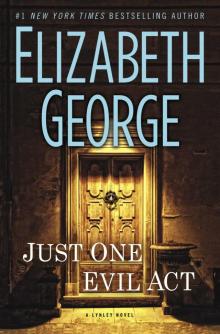 Just One Evil Act
Just One Evil Act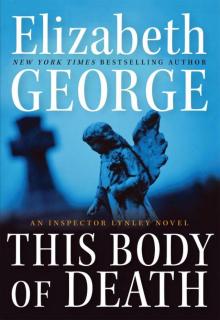 This Body of Death
This Body of Death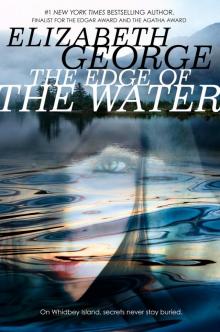 The Edge of the Water
The Edge of the Water For the Sake of Elena
For the Sake of Elena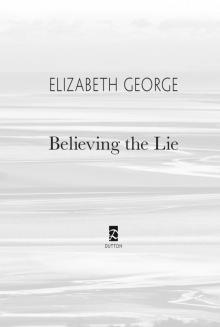 Believing the Lie
Believing the Lie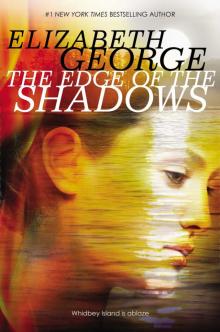 The Edge of the Shadows
The Edge of the Shadows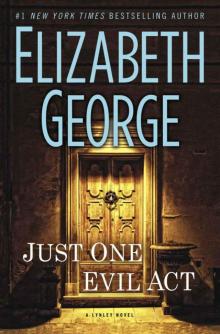 Just One Evil Act: A Lynley Novel
Just One Evil Act: A Lynley Novel In Pursuit of the Proper Sinner
In Pursuit of the Proper Sinner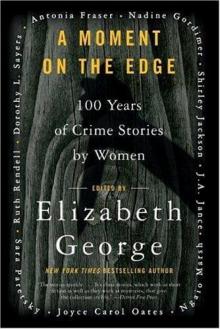 A Moment on the Edge:100 Years of Crime Stories by women
A Moment on the Edge:100 Years of Crime Stories by women Elizabeth I
Elizabeth I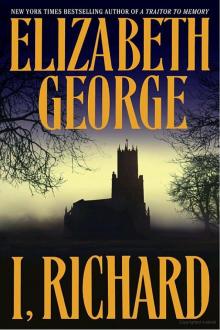 I, Richard
I, Richard A Traitor to Memory
A Traitor to Memory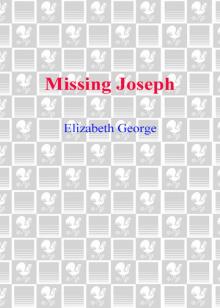 Missing Joseph
Missing Joseph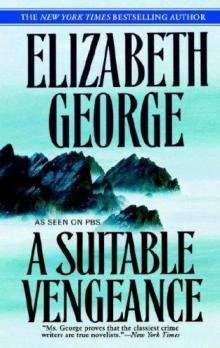 A Suitable Vengeance
A Suitable Vengeance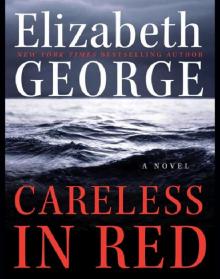 Careless in Red
Careless in Red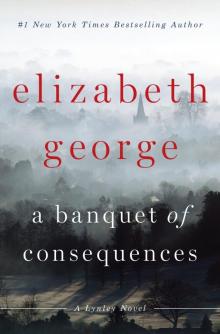 A Banquet of Consequences
A Banquet of Consequences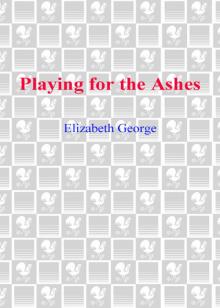 Playing for the Ashes
Playing for the Ashes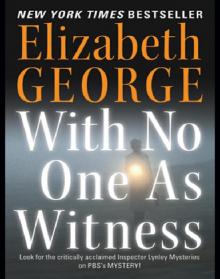 With No One As Witness
With No One As Witness Deception on His Mind
Deception on His Mind The Best American Mystery Stories 2016
The Best American Mystery Stories 2016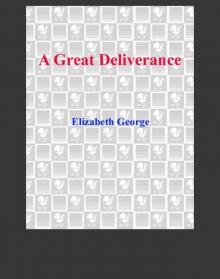 A Great Deliverance
A Great Deliverance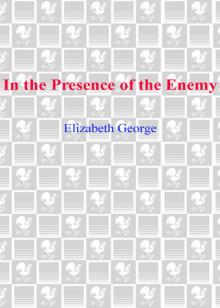 In the Presence of the Enemy
In the Presence of the Enemy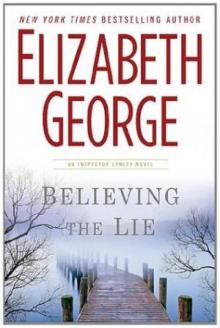 Believing the Lie il-17
Believing the Lie il-17 The Edge of the Light
The Edge of the Light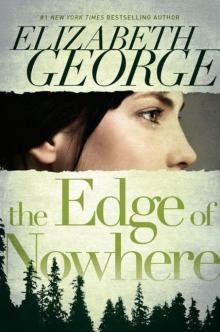 SW01 - The Edge of Nowhere
SW01 - The Edge of Nowhere A Place of Hiding
A Place of Hiding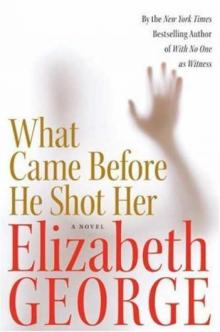 What Came Before He Shot Her il-14
What Came Before He Shot Her il-14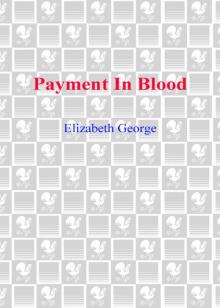 Payment In Blood
Payment In Blood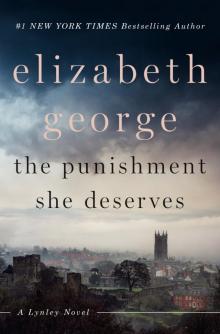 The Punishment She Deserves
The Punishment She Deserves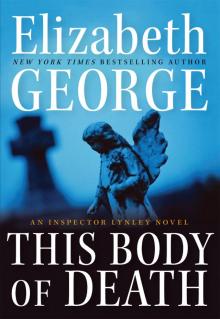 This Body of Death: An Inspector Lynley Novel
This Body of Death: An Inspector Lynley Novel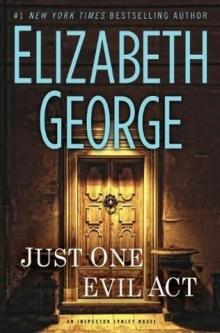 Just One Evil Act il-18
Just One Evil Act il-18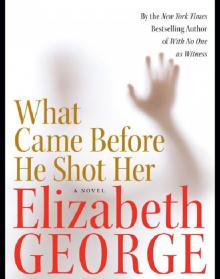 What Came Before He Shot Her
What Came Before He Shot Her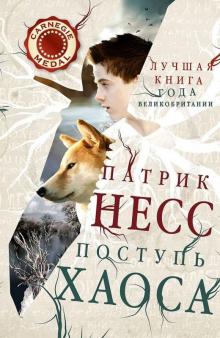 Missing Joseph il-6
Missing Joseph il-6